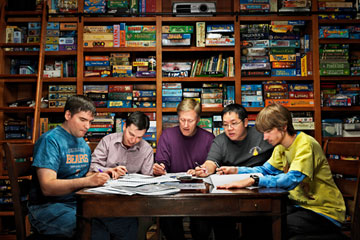
(5 of 7)
Another reason you don't see much puzzling on ESPN is that the rapid development of heuristics is not a very telegenic activity. In Kraljevica the rounds were conducted with about as much fanfare as a practice-SAT session. An announcer said go, and a large TV at the front of the room started ticking off seconds. Chairs creaked. Someone puffed and swept away eraser fluff and started over. Someone else slapped his forehead, V8-ad-style. It's a serious test of nerve, speed and intelligence, but it's not a spectator sport. The action is internal, and the triumphs and disasters come out only after the fact. "You'll hear some very weird conversations during the breaks," says Baxter. "'Oh, I cooked that one' or 'I broke that puzzle,' which means that you went down and made a logical deduction that wasn't valid, and everything felt good till two-thirds of the way through, then you hit a contradiction and had to erase the entire puzzle--something like that. It's an adventure, every puzzle."
The finals of the 2012 WPC demonstrated both the grand intellectual drama of high-level puzzle solving and the difficulty of translating it into anything resembling popular entertainment. After two days and 13 rounds of competition, the top eight individual scorers were pitted against one another in a three-round playoff. The U.S. wound up with two solvers in the final eight: Snyder was in second place, and Mebane was in fourth. Japan also had two finalists; the Netherlands, Poland and Hungary had one each. Germany had one too: Voigt.
In an effort to heighten the drama, the Croatian organizers set up the finals as a series of head-to-head matches, with the players working on 4-by-4-ft. easels, in permanent marker, so the crowd could follow the action. Not everybody was thrilled about the format. "When's the last time you solved a puzzle on a four-foot-square piece of paper?" Baxter asks. "Standing up? Not being able to erase?"
But it worked, up to a point. The mood in the room was electric. In order to give the top finishers from the first two days an advantage, they were allowed to pick their puzzle types; this led to a considerable amount of gamesmanship, with players sizing up their own and others' strengths and weaknesses. When play began, Huang and the other Americans provided color commentary, calling out the names of the puzzles in stage whispers as they came up: Dubai Skyscrapers, Magnets, Battleships, Pipes, X-Kakuro, Tapa, High Winds, Rural Tourism. Voigt--a big guy with a rabbinical beard and a receding hairline, as if the heat of his frontal lobes had burned the hair away from his forehead--wobbled early, nearly losing his first match with the Pole. Snyder and Mebane, the defending champ, bulled through their first rounds in straight sets. When a contestant finished, he (the participants in the playoffs were all male) stepped away from the puzzle and raised a hand, whereupon a Croatian official would check his work for a tense minute, then turn to the audience and say, curtly, "Iz korrekt."
